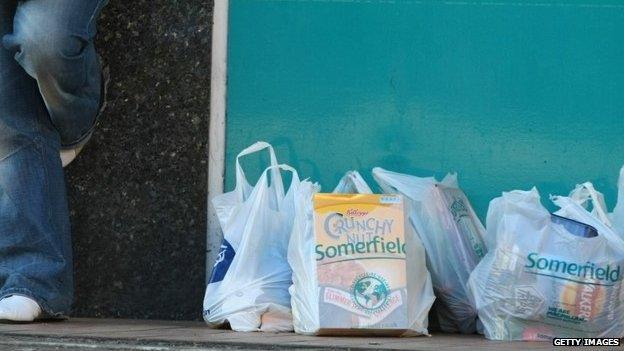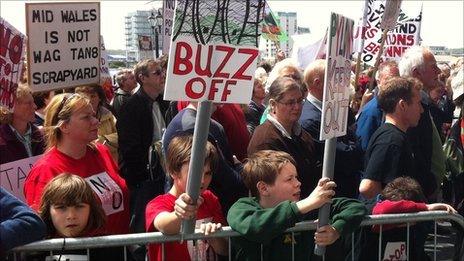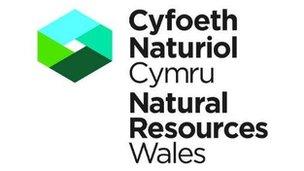Measuring devolution: Environment proves a battleground
- Published

The 5p charge has raised thousands of pounds for charity
Are any parts of the devolution settlement more confusing than the sections dealing with energy and the environment?
Decisions relating to wind farms, the future of nuclear power and who controls our national parks and other natural resources are a big part of the political debate - but it is not always clear who carries the can.
Take consent for energy projects - anything that produces under 50MW of electricity come under the remit of the Welsh government; anything bigger is decided in Westminster. Is that a distinction lost on most people? And is it sustainable when more and more people look to Welsh ministers to give a lead.
Sustainable development was actually written into the constitution of the Assembly when it was set up in 1999. And the Welsh government says it's proud of its record on green issues.
Our Environment Correspondent Iolo ap Dafydd has been looking at whether ministers really have got much to shout about.

Green light for innovation
It may seem like small change, but the 5p charge we pay for plastic bags in shops and takeaways in Wales has become quite a potent symbol of devolution.
The idea came from the member of the public and Welsh government led the way in October 2011 as it looked to cut back on the estimated 350 million carrier bags we were taking home from the major supermarkets each year.
Within six months, the main stores were reporting a 90% reduction in their use, while charities have benefited from the money collected.
Scotland is introducing a charge in October, while England may now follow suit. Northern Ireland brought in a charge last year.
The Welsh government is proud of its green credentials.
Another eye-catching policy was establishing the 870 miles (1,400km) of Wales Coast Path which has driven up tourism figures and encouraged more of us to enjoy physical activity, and is seen as a success beyond Wales.
Recycling in Wales has improved enormously in the past 10 years. Potential penalties for not dealing with waste has led councils to close landfill sites, but also to look at incinerating rubbish again.
These achievements apart, the environment has still been one of the most contentious areas for the Welsh assembly in its first 15 years.

Energy - rich in resources and a fertile ground for protests
First Minister Carwyn Jones and Michael Phillips of renewable energy firm Dulas
Energy is one of Britain's fastest growing industries and to complicate matters, decisions for the largest projects are made outside Wales.
Our country is rich in assets to produce energy from renewable sources but that has led to loud voices opposing many new developments.
The issue is often divisive especially around generating energy. Protests, often involving hundreds of people, have been seen in Powys and on the steps of the Senedd over plans for turbines and power lines.
At times it seems hardly anyone wants to live anywhere near large wind farms, gas or new nuclear power stations.

A protest against Powys wind farm developments in Cardiff in 2011
The innocuous sounding Technical Advice Note 8 was issued in 2005 by the Welsh government, external. Ministers were keen to push along a low carbon economy based on energy from wind, solar and the sea.
Many opinion polls suggest public support for renewable energy.
But to opponents, Tan 8 gave the green light to many developers to apply to build turbines of varying sizes in north, mid and south Wales.
First Minister Carwyn Jones doesn't think the Welsh government's to blame and has called energy "the lifeblood of the economy".
But critics, especially in mid Wales will point to not enough consideration given to connecting potentially hundreds of turbines in remote areas of Wales to the National Grid infrastructure, or how large turbine components are carried along narrow roads.
Even renewable energy developers like Machynlleth-based Dulas are complaining it's been harder to do business here in Wales than elsewhere in Britain.
Principal consultant Michael Phillips said the promised low carbon revolution had been a "whimper".

So how do we judge the Welsh government on its record?
Anne Meikle, head of WWF Cymru, says devolution has been a qualified success for the environment
It's difficult because it's impossible to isolate Wales from the rest of Britain or Europe.
Climate change, flooding and pollution don't respect national borders.
But we do have some useful pointers to show how the Welsh government has protected the environment:
There are 22 indicators which show improvement
17 indicators are about the same
One shows a decline - which relates to the number of birds

Can we live within our means?
A highlight of sustainable ambition for some is still the One Planet One Wales policy established in 2009, which aims to get all of us to live within our means.
Anne Meikle, head of WWF Cymru said it was bold and innovative.
" It was a real plan to deliver only using our fair share of the earth's resources," she says.
"That was a hugely ambitious commitment,. That's reducing our use of resources by 75% - action across the whole of government - and it did have some clear targets and clear plans in it.
"I think that was really innovative. It was recognised globally to be the first government to have a real plan to reduce its footprint."

Doing it differently - three into one

Another clear policy difference in Wales since devolution has been establishing the new environment service. Three organisations were merged to to form Natural Resources Wales in 2013.
This has the tricky task of regulating power stations and businesses as well as conservation and protecting nature.
Roger Thomas, former chief of Environment Agency Wales and Countryside Council for Wales, said: "With hindsight we should have bought together the two with the Forestry Commission into a single body earlier than we have done.
"We have NRW now, but unfortunately it was formed at a time of economic constraints which made it more difficult to bring things into a functioning body."

Battles in agriculture

The issue of TB in cattle linked to badgers was controversial
We shouldn't forget the environment and how regulations have impacted on farming.
In recent years there have been some bitter battles between farmers and the government on TB in cattle and curtailing EU subsidies.
Improving biodiversity is difficult without the help of farmers - or proposals for marine conservation zones which minister Alun Davies scrapped last year - after failing to get fishermen to accept them.


A frozen waterfall in the Brecon Beacons in early 2012
CASE STUDY: HOW A BAD WINTER HIT EMISSION TARGETS
Wales had an 8.0% share of the UK's total net greenhouse gas emissions in 2012.
This was a drop of 18% from the base year.
However, emissions between 2011 and 2012 rose by 5%, predominantly driven by a shift from natural gas to coal combustion due to higher prices.
The rise has also been been blamed on the cold winter in 2011/2012 with sharp rise in demand for heat and coal-burning.
Increases were offset by a decrease in emissions from iron and steel production in Wales during 2012, as Tata's No.4 Blast Furnace re-build at Port Talbot began in the July 2012.
The Welsh government said it remained committed to moving towards a low carbon mix and also wants to devolve new energy powers "to help us maximise the economic potential of renewable energy power generation".
Source: National Atmospheric Emissions Inventory, June 2014, external

What about the future?
Peter Davies, Commissioner for Sustainable Futures wants to involve the grass roots in making decisions
Ministers are turning their attention to ensuring public organisations make their key decisions with the long term interests of the environment at the heart.
The Future Generations Bill , externalwill be used to underpin sustainable attitudes.
Peter Davies, Commissioner for Sustainable Futures, is chairing events across Wales and suggests a different approach to "top down" decision making for the next 15 years, which involves people at the grassroots as much as possible.
"I think there's a lesson probably around onshore wind as far as that's concerned," he said.
"There's also a positive lesson, that small things can be really important and make an iconic difference - let's take the carrier bag charge being introduced first in Wales.
"Or the fact that every newborn child in Wales gets a tree planted for them as a key message of sustainable development from the Welsh government."
The WWF say there are pockets of good practice in policy but others are not pulling in the same direction which affects the pace of change that's needed.
Ms Meikle added: "I'd give [the Welsh government] a pretty good mark, but they don't get top marks because they haven't consistently delivered across the piece - they need to try a bit harder."

So are things better after 15 years?
Since the early days of devolution, the Welsh government has talked about promoting sustainable policies - and since 2006 have a legal duty to sustainable development.
We've heard ministers talk about developing a low carbon economy, focusing on renewable energy because of the natural resources we have in Wales. There have been lots of aspirations, but have ministers been guilty of being high on rhetoric, and falling short on delivery?
Or has the green agenda been knocked back because of the financial turmoil of the past six years?
The Welsh landscape has been something of a battleground over the last 15 years but those on the ground tell me that Wales is a small enough country to make cooperation easier - but more could still be done.